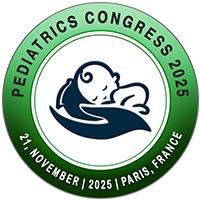
Saad Alqarni
Maternity And Children Hospital Abha, Saudi ArabiaPresentation Title:
Novel mutation in chromosome 11p15.4 causing Niemann-Pick Disease type A in a Saudi child
Abstract
Niemann-Pick disease (NPD) is a rare
autosomal recessive lysosomal storage disorder caused by mutations in the
sphingomyelin phosphodiesterase-1 (SMPD1) gene. Acid sphingomyelinase
deficiency results in progressive lipid accumulation within multiple organs,
leading to hepatosplenomegaly, neurodegeneration, and early mortality. Type A
NPD is the most severe phenotype, typically manifesting in infancy with rapid
neurological decline and poor survival.
We report the case of an 18-month-old Saudi
male who presented with progressive, painless abdominal distension,
hepatosplenomegaly, hypotonia, muscle weakness, and developmental regression.
Neuroimaging was unremarkable, and infectious, hematological, and neoplastic
etiologies were excluded.
Doppler ultrasonography confirmed
organomegaly, and laboratory studies revealed cytopenias and elevated liver
enzymes. Genetic analysis identified a novel homozygous missense mutation in
the SMPD1 gene, located on chromosome 11p15.4 (c.1616A>G; p.Tyr539Cys),
thereby confirming NPD type A. The child was managed with multidisciplinary
supportive care, including nutritional, physical, and occupational therapy. At
follow-up, recurrent respiratory infections and growth delay were noted,
consistent with disease progression.
Discussion: This case highlights the diagnostic challenges of
NPD type A, given its non-specific early presentation. The novel SMPD1 variant
expands the known mutational spectrum of this disorder and provides insight
into genotype-phenotype correlations. The presence of hepatosplenomegaly,
growth restriction, and neuromuscular decline underscores the importance of
early suspicion in pediatric patients with unexplained abdominal distension and
developmental regression. While specific therapies remain limited, early
genetic confirmation facilitates appropriate counseling, anticipatory guidance,
and consideration of future therapeutic options such as enzyme replacement or
substrate reduction therapy.
Conclusion: We present the first reported Saudi case of NPD type
A caused by a novel SMPD1 mutation at chromosome 11p15.4. This case underscores
the necessity of raising clinical awareness, strengthening genetic screening
programs, and enhancing international data-sharing to improve early recognition
and outcomes in rare lysosomal storage disorders.
Biography
Dr. Saad Ali M.
Alqarni is a pediatric resident physician at Abha Maternity and Children
Hospital, Saudi Arabia, under the Saudi Board of Pediatrics program. He earned
his medical degree from the University of Bisha, where he developed a strong
interest in rare pediatric diseases, genetic disorders, and critical care
medicine. Dr. Alqarni has been actively engaged in academic research, with
publications in peer-reviewed journals including Cureus, where he co-authored
case reports on complex pediatric presentations such as agenesis of the corpus
callosum and Niemann-Pick disease type A caused by a novel SMPD1 mutation.In
addition to his clinical training, Dr. Alqarni is committed to advancing
pediatric research and improving early recognition of rare diseases in
children. His academic contributions reflect a focus on multidisciplinary care,
clinical genetics, and optimizing outcomes in critically ill pediatric
patients. He has also presented at local and regional conferences and continues
to build collaborations to strengthen pediatric research in Saudi Arabia and
beyond.Dr. Alqarni aims to pursue subspecialty training in pediatric infectious
diseases or neonatology, with a long-term vision of contributing to global
pediatric healthcare through both clinical excellence and impactful research.

